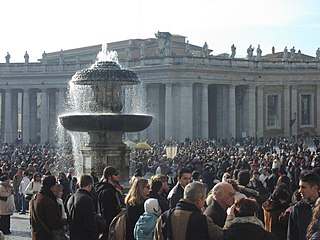| Look up laypeople in Wiktionary, the free dictionary. |
Laypeople may refer to:
- Layperson, someone who is not an expert in a particular field of study
- Laity , members of a church who are not clergy
| Look up laypeople in Wiktionary, the free dictionary. |
Laypeople may refer to:

Chastity, also known as purity, is a virtue related to temperance. Someone who is chaste refrains either from sexual activity considered immoral or any sexual activity, according to their state of life. In some contexts, for example when making a vow of chastity, chastity means the same as celibacy.

Sangha (संघ) is a Sanskrit word used in many Indian languages, including Pali (सङ्घ,saṃgha/saṅgha) meaning "association", "assembly", "company" or "community"; Sangha is often used as a surname across these religions. It was historically used in a political context to denote a governing assembly in a republic or a kingdom, and has long been used by religious associations including the Buddhists, Jains and Sikhs. Given this history, some Buddhists have claimed that the tradition of the Sangha represents humanity's oldest surviving democratic institution.

A judge is a person who presides over court proceedings, either alone or as a part of a panel of judges. A judge hears all the witnesses and any other evidence presented by the barristers or solicitors of the case, assesses the credibility and arguments of the parties, and then issues a ruling in the case based on their interpretation of the law and their own personal judgment. A judge is expected to conduct the trial impartially and, typically, in an open court.

Thomas Dale DeLay is an American author and retired politician who served as a member of the United States House of Representatives, representing Texas's 22nd congressional district from 1985 until 2006. He was Republican Party House Majority Leader from 2003 to 2005.

Ordination is the process by which individuals are consecrated, that is, set apart and elevated from the laity class to the clergy, who are thus then authorized to perform various religious rites and ceremonies. The process and ceremonies of ordination vary by religion and denomination. One who is in preparation for, or who is undergoing the process of ordination is sometimes called an ordinand. The liturgy used at an ordination is sometimes referred to as an ordination.

A justice of the peace (JP) is a judicial officer of a lower or puisne court, elected or appointed by means of a commission to keep the peace. In past centuries the term commissioner of the peace was often used with the same meaning. Depending on the jurisdiction, such justices dispense summary justice or merely deal with local administrative applications in common law jurisdictions. Justices of the peace are appointed or elected from the citizens of the jurisdiction in which they serve, and are usually not required to have any formal legal education in order to qualify for the office. Some jurisdictions have varying forms of training for JPs.
In religious organizations, the laity consists of all members who are not part of the clergy, usually including any non-ordained members of religious orders, e.g. a nun or lay brother.

A bricklayer, which is related to but different from a mason, is a craftsman and tradesman who lays bricks to construct brickwork. The terms also refer to personnel who use blocks to construct blockwork walls and other forms of masonry. In British and Australian English, a bricklayer is colloquially known as a "brickie". A stone mason is one who lays any combination of stones, cinder blocks, and bricks in construction of building walls and other works. Bricklaying is a part of masonry.

A bhikkhu is an ordained male in Buddhist monasticism. Male and female monastics are members of the Sangha.

In Buddhism, refuge or taking refuge refers to a religious practice, which often includes a prayer or recitation performed at the beginning of the day or of a practice session. In Sutrayana, refuge is taken in the Three Jewels which are the Buddha, the Dharma and the Sangha.
In Christianity, an oblate is a person who is specifically dedicated to God or to God's service.
A religious is, in the terminology of many Western Christian denominations, such as the Catholic Church, Lutheran Churches, and Anglican Communion, what in common language one would call a "monk" or "nun", as opposed to an ordained "priest". A religious may also be a priest if he has undergone ordination, but in general he is not.

The 2006 Texas 22nd congressional district election for the 110th Congress was held on November 7, 2006, and attracted considerable attention because this district was represented by former House Majority Leader Tom DeLay, a prominent member of the Republican Party, who resigned after being indicted and subsequently winning the Republican primary. Because of Texas state law, Republicans, in order to hold on to the seat, would have had to win a write-in campaign, something that has only been done four other times in the history of U.S. congressional elections.
The Very Reverend is a style given to members of the clergy. The definite article "The" should always precede "Reverend" as "Reverend" is a style or fashion and not a title.

The Anglican ministry is both the leadership and agency of Christian service in the Anglican Communion. "Ministry" commonly refers to the office of ordained clergy: the threefold order of bishops, priests and deacons. More accurately, Anglican ministry includes many laypeople who devote themselves to the ministry of the church, either individually or in lower/assisting offices such as lector, acolyte, sub-deacon, Eucharistic minister, cantor, musicians, parish secretary or assistant, warden, vestry member, etc. Ultimately, all baptized members of the church are considered to partake in the ministry of the Body of Christ.
In some jurisdictions, an assessor is a judge's or magistrate's assistant. This is the historical meaning of this word.
A lay judge, sometimes called a lay assessor, is a person assisting a judge in a trial. Lay judges are used in some civil law jurisdictions. Lay judges are appointed volunteers and often require some legal instruction. However, they are not permanent officers. They attend proceedings about once a month, and often receive only nominal or "costs covered" pay. Lay judges are usually used when the country does not have juries. Lay judges may be randomly selected for a single trial, or politically appointed. In the latter case they may usually not be rejected by the prosecution, the defense, or the permanent judges. Lay judges are similar to magistrates of England and Wales, but magistrates sit about twice as often.

Catholic laity are the ordinary members of the Catholic Church who are neither clergy nor recipients of Holy Orders or vowed to life in a religious order or congregation. Their mission, according to the Second Vatican Council, is to "sanctify the world".

The district courts of Sweden are the court of first instance for the general courts in Sweden. The next instance are the courts of appeal. The district court handle criminal cases, some civil law disputes and a number of non-contentious matters. There are 48 district courts across Sweden, and the catchment area is based on the geographic boundaries of several municipalities. The number of employees vary, from ten to several hundreds.
The easiness effect is the claim that as a result of science popularization laypeople develop an overconfident scientific understanding. This results in science-related decision-making that reflects a misunderstanding of popular science rather than the judgment of professional scientists.